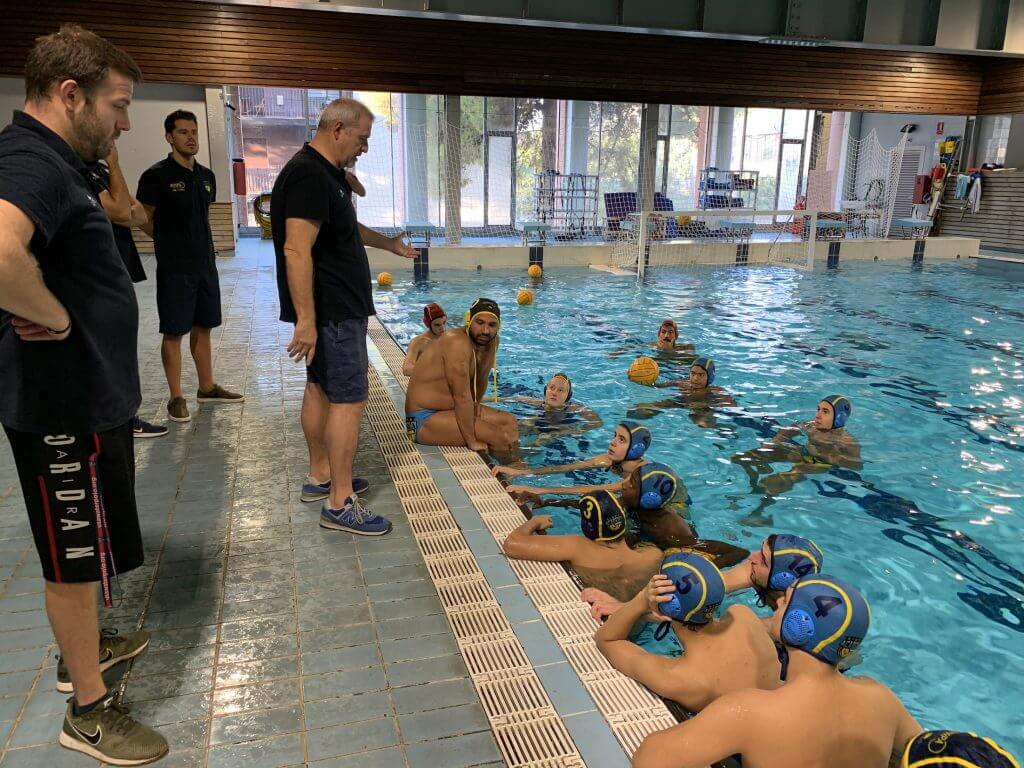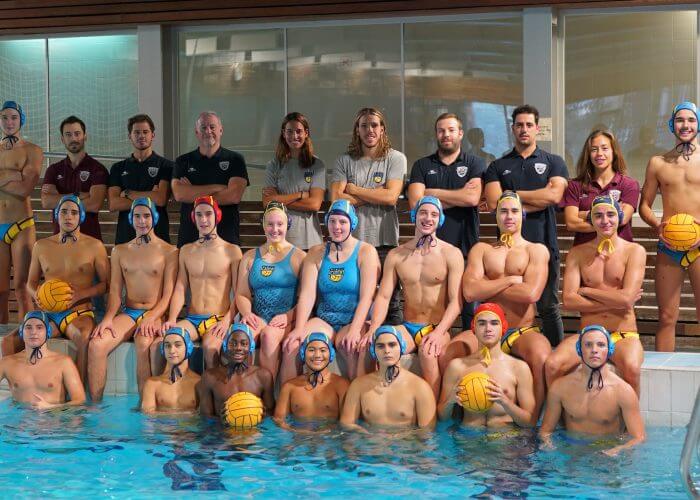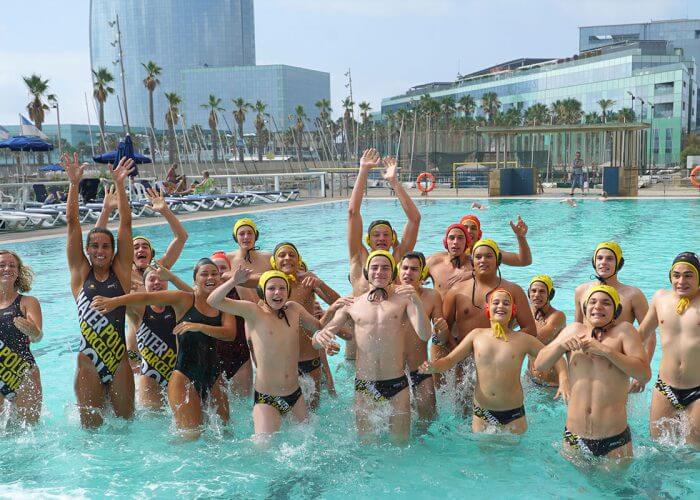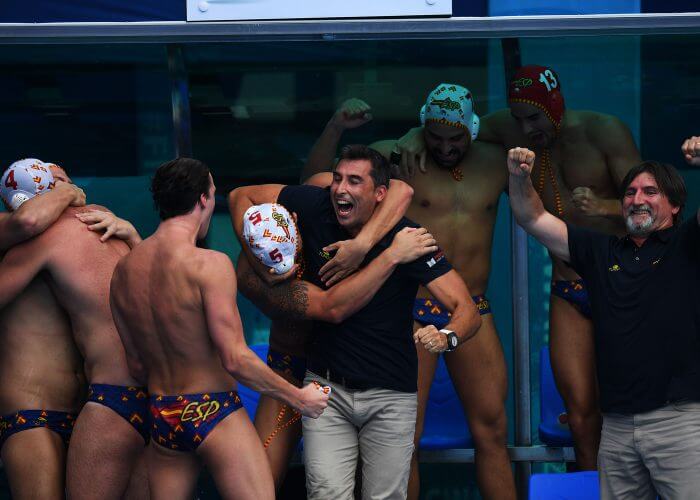Dispatches from Spain: Quim Colet of Barcelona International Water Polo Academy

With much of the sporting world shut down due to the coronavirus outbreak, Swimming World continues to reach out to those areas struggling against what the World Health Organization (WHO) has now labeled a pandemic.
In the past week, Spain has seen a spike in Covid-19 infections, with Wednesday’s count hitting 47,000 infected and more than 3,400 deaths. The tragedy for everyday Spainards is substantial; for those devoted to water polo the impact is certainly far less severe. But the loss of athletic opportunities has impact throughout the country, including in Barcelona, home to Spain’s national men’s and women’s teams as well as the Barcelona International Water Polo Academy, a program popular among Spaniards and internationals alike.
Quim Colet, BIWPA’s sporting director as well as a former player as well as an assistant coach for the men’s and women’s national teams, responded to questions about how his city is negotiating current circumstances, what the impact has been on his company’s business and where there’s a ray of hope in the gloom of a pandemic.
– What is the current mood in Barcelona—obviously as relates to the coronavirus outbreak but also how your city is dealing with social challenges.
Strange times here in Barcelona. Schools and colleges closed, most of the stores as well. Everyone at home unless it is strictly necessary. We’ve never seen anything like this before, and of course companies like ours are suffering a lot.

The polo academy—when times are good… Photo Courtesy: BIWPA
Athletes not being able to travel or train is hurting all of us at BIWPA. We had to cancel all the Academy trainings, the water polo Easter Camp. U.S. athletes that were coming to the Academy for Spring Break won’t be able to travel either.
We hope that by summer everything gets back to normal, as we have most of our activities during this period.
In the meantime, we all keep working from home. It is time now to think about new ideas and projects, and most of them –I have to tell you– have to do with the U.S. We want to get bigger there, especially in areas where athletes and teams don’t get the chance to compete and train all year round. We’re now focusing on the East Coast.
– You have a water polo academy that has served thousands; is it possible to continue providing on-site water polo training? If not, what sort of services is your academy able to provide its members?
This is our fifth season with the Academy, and we are very happy with how everything is running right now. We’re offering something unique in the world, as I don’t know of any program offering high school studies combined with high performance water polo trainings and competition.
With the COVID-19 we had to cancel all the practices and all our international athletes went back home. At the moment the crisis hit Spain, we had roughly 30 athletes at the Academy: 10 locals and 20 foreigners, including 13 from the U.S.
With everyone at home , we decided to create a WhatsApp group with all the Academy athletes from the first year (including the the athletes that are already in college or back home). Our coaches send daily dry land sessions for them. They are also available for any questions or concerns they might have, college-related or of any other kind.

Photo Courtesy: BIWPA
As for video support, we’re currently working on a new project: A series of videos featuring professional athletes or athletes from our Academy, performing drills and training techniques. The videos will be mostly made with the Watlicam, a camera that films above and below the waterline simultaneously, and will include observations and comments from our coaches. We plan to offer the videos on our website, but as I said, it is still a project (though we hope to release it soon, next week or so). I’ll keep you posted!
At the Academy, we hold Watlicam sessions once a week with our athletes to focus on the details. The coaches work one-on-one with them and give feedback regarding the body positioning, legs, etc. That’s something very helpful.
– Travel restrictions have severely impacted play, including a scheduled trip for the men’s national team to play the Americans in California. How difficult is if for top polo players to stay sharp when there’s no competition—or even practice time—available.
All the dry land trainings and workouts from home are great and very important to keep in shape. I am also glad we are seeing great initiatives coming from some water polo players and clubs in Spain (and all over the world) to provide ideas and exercises to train from home.
The team I coach, Club Natació Sabadell (men’s team), is playing in Spain’s Honor Division, so of course I am aware of the situation first-hand. Our physical trainer sends training every day and they are all following from home, but our medium is water, so it will never be the same.
Our American player, Matt Farmer went back home and he is also in lock down. It is a very unique situation, unprecedented, but of course currently the top priority is health.
[A Boy from Illinois Makes It Big in California Water Polo]
As I said, water polo happens in the water, so it is obvious that for us, for example at the Academy, all the work inside the pool is key, as one of our main goals is to train smart players. We want them to dominate the fundamentals and the individual technique, and make the right decisions in the right moments of the game.
– The Tokyo Games are in peril; how disappointing would cancellation be for Spain’s men’s and women’s teams that have emerged as strong medal contenders at the 2020 Olympics?
It goes without saying that from all sports competitions being affected by the coronavirus, the Olympic Games are the most important. It would be a big disappointment for all the athletes that have trained so hard for four years.

Spain celebrates upset of Croatia in 2019 FINA Worlds. Photo Courtesy: Hiroyuki Nakamura
I think it is a good moment to remember the words of the current Spain’s national team coach for the men’s team, David Martín. When he was hired after Gaby Hernandez in 2017, he stated that he was going to build a team thinking about Tokyo 2020.
After a 9th position at the Budapest World Championship in 2017, unexpectedly, Martín got three silver medals in the next three years: Barcelona 2018 European [Championship], Gwangju 2019 World Championship, and Budapest 2020 European. After these three big achievements, Spain has gained back the respect that they earned back in the end of the 20th century.
[2020 European Water Polo Championship Finals: A Spanish Affair with Hungarian Men, Russian Women]
All the work that has been done from the federations and high=performance centers (I was for eight years the Technical Director of the Catalan Swimming Federation) now is paying off, also with the youth teams.
As for the women’s team, they proved again to all Europe that they are still the best team with the gold medal in Budapest the past January, and I think that was a great morale booster before the Olympics, to face still a bigger challenge: Defeat the unbeatable US women’s team, something they only achieved in Barcelona 2013 World Championships (quarter finals).
So of course, the disappointment would be very big.
– This is an unprecedented health crisis; is there any time in either of your memories when something this severe has impacted your life, your academy or your city?
Definitely no. I never saw anything like this crisis before, and I think it has just started.
– To end on a positive note, what’s something you hang on to as a great polo experience—either in your life OR in the life of Barcelona?
My biggest water polo experience have been the Olympic Games in Beijing with the men’s national team. I also have very good memories from the silver medal at the 2009 World Championships in Rome.



